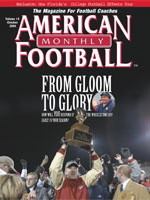AMERICAN FOOTBALL MONTHLY THE #1 RESOURCE FOR FOOTBALL COACHES
Article CategoriesAFM Magazine
|
Learning CurveNorth Alabama’s Mark Hudspeth Has His Own Philosophy That Seems to Always Lead to the Same Thing: Successby: David Purdum © More from this issue Mark Hudspeth has not wasted any time traveling down his career path. Yet, at each stop along the way – some more rocky than others – he has made sure to slow down, take his time and learn. “I think it’s very important to focus on the job at hand,” says Hudspeth, now in his third year as head coach at Division II North Alabama. “Concentrate on where you are at and where you are working. Sometimes guys are too busy looking for the next big opportunity, instead of concentrating on where they are at and what they are doing.” During his 12-year career journey, Coach Hud, who turns 36 in November, has been a strength and conditioning coordinator, a quarterback coach and a wide receiver coach. He’s coached the tight ends and the running backs. He’s won a hig....The full article can only be seen by subscribers. Subscribe today!
|
|
|||||||
| HOME |
MAGAZINE |
SUBSCRIBE | ONLINE COLUMNISTS | COACHING VIDEOS |
Copyright 2026, AmericanFootballMonthly.com
All Rights Reserved





